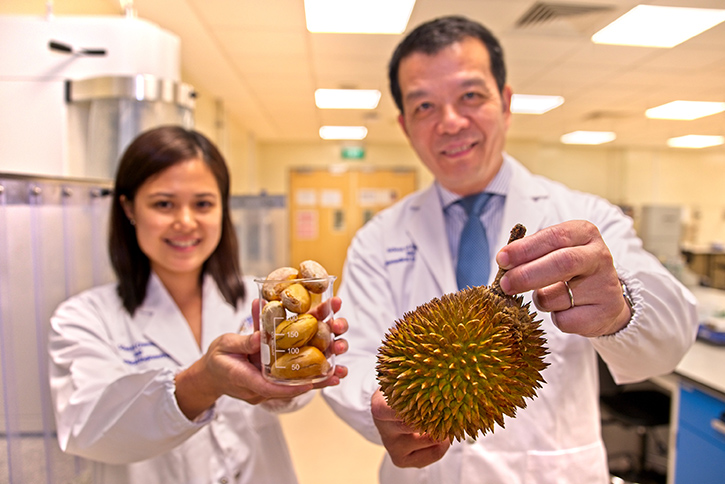
Scientists from Nanyang Technological University, Singapore (NTU Singapore) have developed an all-natural food stabiliser from the seeds of the durian fruit.
The durian, a thorny fruit known for its unique taste and smell, is popularly dubbed the King of Fruits in Southeast Asia.
Its seeds (about 3-4 cm in diameter) are normally thrown away after the flesh is consumed, but using a patented technique to harvest the thick gum from the seeds, an NTU team has shown that it could be used as a natural food stabiliser.
Food stabilisers are commonly used in prepared food items to give it a uniform texture and it contains sugar-protein biopolymers, which bind various ingredients that naturally tend to separate.
Some examples include gelatine and gum arabic which are added in soft candy and sweeteners, pectin in dairy products, and emulsifiers in lotions and cosmetics.
The durian gum harvested by the NTU researchers not only contains necessary elements to serve as a food stabiliser, but also supports probiotics. These are good bacteria that help people maintain a healthy digestive system.
When compared with regular powder-based probiotics in commercial food stabilisers, the durian seed gum was found to be 20 per cent more effective in prolonging probiotics’ lifespan, reported the team in the journal Frontiers in Sustainable Food Systems in September 2018.
In a fridge temperature of four degrees Celsius, the probiotic count using existing commercial stabilisers was significantly reduced after five weeks, compared to two months for the durian seed stabiliser.
The findings are the culmination of a three-year research project led by Professor William Chen, Director of NTU’s Food Science and Technology programme, who is now in talks with several interested companies to license and commercialise the research findings.
Potential applications include use in probiotic beverages and as natural food stabilisers. As the food stabiliser from durians are plant-based, they are also suitable for vegetarians and those who avoid animal-based food stabilisers such as gelatine.
“The majority of consumer food contains food stabilisers, which are indispensable to ensure that various ingredients that do not mix well can gel harmoniously. What we have done is to use something we often ignore when eating durians – its seeds – to produce a 100 per cent natural food stabiliser that can even keep our gut system healthy,” said Prof Chen.
Prof Chen added that the gum can also be used directly as a cheap medium to grow probiotics bacteria, which reduces the production costs for probiotic beverages.
“The total cost for conventional industrial processes to produce probiotic compounds is estimated at about $60 for every litre of the growth medium. In comparison, our discovery at NTU would only cost around $13 per litre to produce, which is 4.5 times more cost effective.”
Providing an independent view of the discovery made by the NTU research team, Ms Shilpa Thakker, Senior Director for Research, Quality, Nutrition & Technology at Kellogg Asia Pacific Pte. Ltd., said, “Here we see innovation, sustainability and commercial ability delivering a novel ingredient that can be used across multiple (food and non-food) categories. This innovation gives an overview of leveraging current food trend in the use of food by-products to develop functional ingredients.
“Future studies should now address the challenges associated with the sensory properties of the new products including ingredients obtained from by-products, and consumers’ attitudes towards these sustainable novel food whilst meeting the functional properties it promises.”
Prof Chen said that his research was largely driven by the challenges that climate change brought to future food production systems, and the need to overcome them sustainably through upcycling food by-products.
“At present, a majority of natural stabilisers are harvested from acacia trees’ gum, but with climate change rapidly affecting seasonal harvests, alternative and more sustainable sources need to be explored.
“On average 6 million durians were consumed by Singaporeans in the first half of 2018[1]. If each durian contained around 300g of seeds, 3,600 tonnes of seeds were thrown away that year. By using durian seeds, we not only demonstrate that food by-products can be upcycled in a cost-effective way but also how it can be beneficial for industry and society,” said Prof Chen.
Prof Chen and his team had previously developed upcycling practices for other food by-products such as soybean waste and brewer’s spent grain, converting them into useful ingredients for consumption.
[1] See Asia One article, 20 Jul 2018.
Reference:
Paper titled “Dual Use of a Biopolymer from Durian (Durio zibethinus) Seed as a Nutrient Source and Stabilizer for Spray Dried Lactobacillus Plantarum” published in Frontiers in Sustainable Food Systems on 3 September 2018.
About Nanyang Technological University, Singapore
A research-intensive public university, Nanyang Technological University, Singapore (NTU Singapore) has 33,000 undergraduate and postgraduate students in the Engineering, Business, Science, Humanities, Arts, & Social Sciences, and Graduate colleges. It also has a medical school, the Lee Kong Chian School of Medicine, set up jointly with Imperial College London.
NTU is also home to world-class autonomous institutes – the National Institute of Education, S Rajaratnam School of International Studies, Earth Observatory of Singapore, and Singapore Centre for Environmental Life Sciences Engineering – and various leading research centres such as the Nanyang Environment & Water Research Institute (NEWRI) and Energy Research Institute @ NTU (ERI@N).
Ranked 12th in the world, NTU has been placed the world’s top young university for the past five years. The University’s main campus is frequently listed among the Top 15 most beautiful university campuses in the world and it has 57 Green Mark-certified (equivalent to LEED-certified) building projects comprising more than 230 buildings, of which 95% are certified Green Mark Platinum. Apart from its main campus, NTU also has a campus in Singapore’s healthcare district.
Source
Nanyang Technological Universit, press release, 2019-01-17.
Supplier
Nanyang Technological University (Singapore)
Share
Renewable Carbon News – Daily Newsletter
Subscribe to our daily email newsletter – the world's leading newsletter on renewable materials and chemicals










